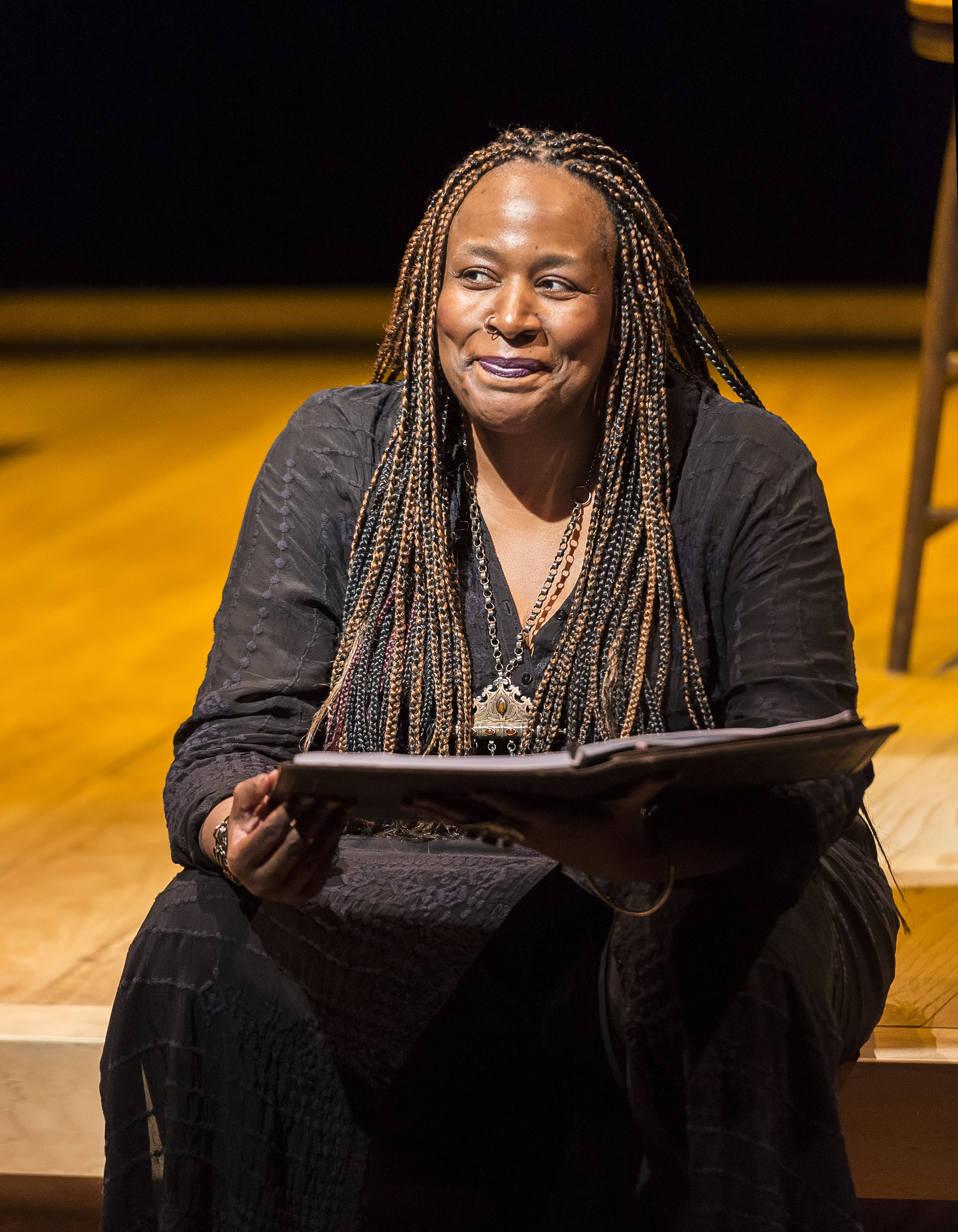Review of Forever at Long Wharf Theatre Forever, the latest play by playwright/performer Dael Orlandersmith, invites its audience to consider what happens when a born storyteller undertakes what she calls “the ‘dreaded first person,’” shaping theater from her own experience. In the playbill, Orlandersmith points out that the play “is not verbatim; it is a memoir play versus an autobiographical play,” a way of cautioning us against taking everything said as “fact,” but also a way of highlighting how subjective a young person’s perspective is, how tied to impressions that can never pretend to omniscience.
Onto a handsome wooden stage, flanked on three sides by photos of her family and her young self, the imposing and riveting performer enters in an offhand manner, to the strains of Marianne Faithful’s version of Patti Smith’s “Ghost Dance,” its incantatory vocal insisting “we shall live again.” Setting the scene, Orlandersmith invites us to famed Père Lachaise cemetery in Paris, where she, like so many others, finds herself on a pilgrimage to the graves of the many greats buried there. She claims kin with many of the interred artists and writers—Edith Piaf, Richard Wright, Chopin, Colette, Proust, Apollinaire—and gravitates to the auratic burial place of The Doors’ charismatic leader Jim Morrison, whose music inspired her in her girlhood in a Harlem ghetto. With that gesture to her formative years, Orlandersmith opens her monologue to the unquiet ghost that haunts Forever: Beula Camradora Smith, the playwright’s abusive, manipulative, alcoholic mother.
What ensues in this well-paced memory play is a form of psychic wrestling. Orlandersmith evokes the ghosts of her past to grapple with them before us. So close to the bone is her narrative, it’s easy to imagine she’s telling the story as she goes, verbalizing events as she recalls them. Orlandersmith’s ease on the stage lets us know this has all been worked out beforehand but her manner—confiding, considering, pondering, reliving—makes the script feel spontaneous and open-ended. As with any social encounter that takes its direction from the personal and anecdotal, Forever uses reminiscence to give the audience a sense of who this character is, as we piece together the events that shaped her.
One such event is a harrowing rape, recounted with a dramatic shift of lighting and register, that not only attests to the narrator’s personal strength in overcoming such trauma, but also creates a fully re-imagined world of vulnerability and innocence as the young girl fixes upon a kind and sympathetic Irish policeman as a sort of knight of saving grace. Ultimately, even such an appalling crime, an affront to both mother and child, is grist for the struggle with the mother’s memory, found wanting at each new stage. As the play goes on, we begin to sense a subtle shift from the perspective of a girl or a young woman as Orlandersmith, in her mid-fifties, moves toward a mature consideration of her mother, dead for 20 years.
The turning point arrives through a series of richly imagined scenes; the mother holding court sweetly to “surrogate daughters,” her nurses at the hospital, while unable to stop herself belittling her actual daughter, leads to a scene with the mother’s corpse in the morgue, where the attendant’s line “the dead can’t hurt you” sets up the long untangling of how one comes to terms with the ghosts of one’s past. Ultimately, the living are the victors, and, as author, Orlandersmith is able to shape a past that puts the mother’s dramas and untold stories into the context of the daughter’s self-invention. And yet Orlandersmith, in the play’s close, seems conflicted enough to let us know that even an entire work devoted to a major relationship isn’t enough to say all that was unsaid in life or to lay to rest all that still perplexes and discomfits.
A tour de force of the art of monologue, Forever is a brave memory play that presents sad facts, harsh truths, and joyful inspirations with a keen grasp of how malleable such things become in the remembering and in the telling. With her penetrating gaze and captivating manner, Orlandersmith plays thoughtful hostess to some formidable objects of her inner landscape, offering the insights that come with clear-eyed self-appraisal. Orlandersmith’s work has long found favor with the Long Wharf Theatre, and it’s fitting that this most personal of her works should be staged as part of the 50th anniversary of the theater, attesting to the value of the living presence of theater in so direct a way.
Forever By Dael Orlandersmith Directed by Neel Keller
Set Design: Takeshi Kata; Costume Design: Kaye Voyce; Lighting Design: Mary Louise Geiger; Sound Design: Adam Phalen; Dramaturg: Joy Meads; Production Stage Manager: Lloyd Davis, Jr.
Long Wharf Theatre January 1-February 2, 2015


